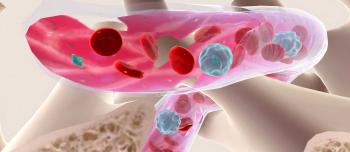In July, Bayer HealthCare announced that it had begun patient enrollment in a multinational, multicenter Phase III trial to evaluate its investigational compound BAY94-9027 for the treatment of hemophilia A.
The PROTECT VIII (PROphylaxis in hemophilia A patienTs via directly pEgylated long-aCTing rFVIII) trial is designed to investigate whether BAY94-9027, a recombinant human factor VIII (rFVIII), can prolong the duration of protection from bleeds with less frequent infusions when used prophylactically. The drug is also being developed to treat acute bleeding. BAY94-9027 has been engineered to extend the half-life of rFVIII while preserving full biologic activity.
The study is designed to measure the safety and efficacy of BAY94-9027 with different dosing frequencies in both prophylactic and on-demand treatment of bleeding in adults and adolescents with severe hemophilia A. The study will enroll 120 to 140 previously treated people worldwide.
“Bayer has more than 20 years of research and clinical experience in hemophilia, and continues to invest in innovative ways to advance patient care, such as the development of BAY94-9027,” said Kemal Malik, MD, Member of the Bayer HealthCare Executive Committee and Head of Global Development. “A longer-acting rFVIII product may result in significant benefit in long-term outcomes and quality of life improvements for people with hemophilia A.”
Prophylactic Effectiveness Shown in Kogenate® Trial
In other news, Bayer HealthCare announced that in a recent clinical trial, Kogenate®, its recombinant factor VIII product, was effective and well tolerated in reducing bleeding frequency in adults with severe hemophilia A when administered as a secondary prophylactic regimen (begun after multiple bleeding events have already occurred) versus on-demand treatment. The trial was part of the SPINART study, an ongoing study designed to evaluate the effect of secondary prophylaxis with Kogenate® Bayer on bleeding frequency and joint damage compared to episodic treatment in adults with severe hemophilia A. These data were presented at the World Federation of Hemophilia’s World Congress, July 9th-12th, in Paris, France.
The study included 84 subjects who were randomized in two groups, receiving either prophylaxis three times per week or on-demand treatment, with a total follow up period of three years. After a median follow-up period of 1.7 years, results showed significantly fewer total bleeding events occurred per year with prophylaxis vs. on-demand (median of 0 vs. 27.9, respectively). No bleeds were seen in 52% of the patients on prophylaxis.
The results also showed significantly fewer joint bleeds with prophylaxis vs. on-demand (median of 0 vs. 21.2). No bleeds were reported in 62% of prophylaxis patients. The majority of bleeds in prophylaxis patients were mild (44%) or moderate (36%), while most bleeds in on-demand patients were moderate (58%) or severe (19%). Observed adverse events were consistent with the product insert and no inhibitor formation was reported.
“Patients on the prophylactic regimen experienced significantly fewer bleeds than those using on-demand treatment,” said Marilyn Manco-Johnson, MD, Principal Investigator of the study. She is Director of the Mountain States Regional Hemophilia and Thrombosis Center, University of Colorado at Denver and Health Sciences Center. “Those bleeds that did occur on the prophylactic regimen were predominantly mild to moderate. Such information can help healthcare professionals provide appropriate treatment to their patients.”
Source: Bayer HeathCare press releases dated July 8 and July 12, 2012





